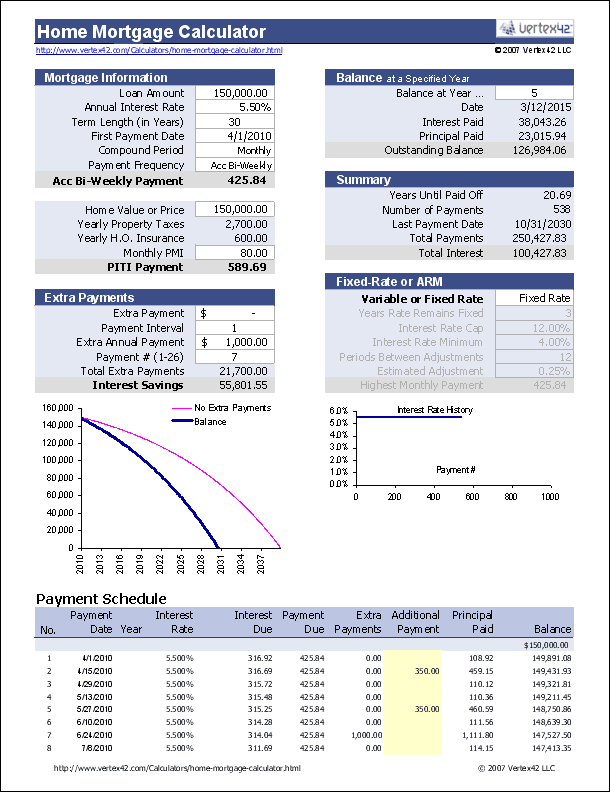Early Mortgage Payoff v with a Mortgage How to Decide
Post on: 8 Октябрь, 2015 No Comment

- October 16, 2013
Some people enjoy the peace of mind that comes with being free from debt in retirement. But warm and fuzzy feelings should be weighed against solid financial facts. Whether it makes financial sense to retire your mortgage when you retire depends on many factors in your individual situation—and there’s no easy answer.
The interest rate on your mortgage may be the single biggest factor in this decision, according to Rande Spiegelman, vice president of financial planning, Schwab Center for Financial Research. He points out, If the rate on the mortgage is low, prepaying the loan might not be the best option. It may be better to maintain liquidity of your funds and diversify your assets.
Should you pay or stay? Spiegelman says you should consider these things:
Reasons for early pay-off of your mortgage
- Limited or reduced income stream in retirement: The monthly mortgage payment may represent a significant chunk of your income. Eliminating this payment can greatly reduce the amount of cash you need to meet monthly expenses.
- Avoiding interest-rate risk: While there’s potential upside to keeping the loan and investing your money elsewhere, market fluctuations could reduce the value of your investments. Paying off your loan, on the other hand, can be seen as earning the equivalent interest rate.
- Savings on interest: Depending on how long the term of the mortgage still has to run and the size of the debt, you may pay thousands or tens of thousands of dollars in interest. Paying off the mortgage early frees up that future money for use elsewhere. (While you would lose the mortgage interest tax deduction, the after-tax savings cost of the debt can still be substantial. As well, as you get closer to paying it off, more of the monthly payment goes to principal and the deduction decreases.)
- Peace of mind: For folks for whom it’s important to be debt-free, the numbers aren’t everything, Spiegelman acknowledges. If you do decide to pay off your mortgage before you retire, he advises that you use funds from taxable accounts first. Withdrawals from IRA or 401k accounts will be taxed as income in the year they’re withdrawn, reducing the effective savings on interest, he notes. On the other hand, using cash from taxable accounts could lower the total tax bill, assuming you don’t have to pay significant capital gains taxes in the process.
Reasons to keep a mortgage:
- Incomplete retirement funding: If you have not contributed the maximum amount to 401k or IRA accounts, this should be the first step.
- Higher-interest debt: You should consider using extra cash to pay off other kinds of debt that carry higher interest rates, especially non-deductible debt such as credit-card debt, before you pay down the mortgage.
- Lower cash reserves: Paying off the mortgage could significantly reduce the amount of cash you have available for emergencies, general expenses and discretionary spending. Before retiring your mortgage, make sure you have enough cash to cover your needs, minus income you’ll receive from non-portfolio sources such as Social Security or pensions. This reserve should include the funds for property taxes, insurance and home maintenance. You don’t want to end up being house-rich and cash-poor.
- Opportunity costs: While paying off the mortgage is risk-free in the sense that there’s no volatility in this investment, you do risk losing out on potential gains you might have made by investing the money elsewhere. Compare the mortgage interest rate to the after-tax rate of return on an investment such as a high-quality, tax-free municipal bond with a similar term to determine whether investing the funds makes better sense than paying off the mortgage.
- Diversifying your investments: One of the best ways to try and increase opportunities for growth is to hold a variety of investments in different asset classes. Tying up significant funds in your home equity reduces those opportunities—and even if your house appreciates in value, you would have to either sell it or refinance it to tap into that equity.
- A possible move: If you contemplate moving in the next few years, you might as well carry the existing mortgage until then.
If your mortgage has no prepayment penalty, an alternative to paying it off entirely before you retire is paying down the principal. You can do this by making an extra principal payment each month or by sending in a partial lump sum. This tactic can save a significant amount of interest and pay off the loan much quicker while preserving liquidity and diversification. In some circumstances, refinancing with a lower interest rate may make sense.
The best strategy for any individual depends on the mortgage’s interest rate, as well as on his or her goals, preferences and circumstances.














